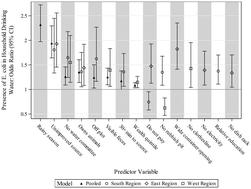当前位置:
X-MOL 学术
›
Environ. Sci.: Water Res. Technol.
›
论文详情
Our official English website, www.x-mol.net, welcomes your feedback! (Note: you will need to create a separate account there.)
Identifying predictors of E. coli in rural household water in sub-Saharan Africa using elimination regression
Environmental Science: Water Research & Technology ( IF 5 ) Pub Date : 2024-02-22 , DOI: 10.1039/d3ew00915g Donald Fejfar 1, 2 , Wren Tracy 3 , Emma Kelly 1, 4 , Michelle Moffa 1 , Robert Bain 5 , Jamie Bartram 1, 6 , Darcy Anderson 1 , Ryan Cronk 1
Environmental Science: Water Research & Technology ( IF 5 ) Pub Date : 2024-02-22 , DOI: 10.1039/d3ew00915g Donald Fejfar 1, 2 , Wren Tracy 3 , Emma Kelly 1, 4 , Michelle Moffa 1 , Robert Bain 5 , Jamie Bartram 1, 6 , Darcy Anderson 1 , Ryan Cronk 1
Affiliation

|
Exposure to fecally contaminated drinking water contributes to the global disease burden, especially in sub-Saharan Africa (SSA). We used cross-sectional data and elimination regression analysis to examine factors influencing E. coli contamination in household drinking water samples from 4499 rural households in nine countries in SSA (Malawi, Mozambique, and Zambia in Southern Africa; Ghana, Mali, and Niger in Western Africa; and Kenya, Rwanda, and Tanzania in Eastern Africa). The proportion of household water samples containing E. coli was 71%, ranging from 45% (Malawi) to 89% (Tanzania). Pooled and multi-country predictive logistic regression models showed that using an unimproved-type water source, the absence of a community water committee, and domestic animal ownership were significantly associated with household drinking water contamination. Household water treatment and storage practices, sanitation and hygiene practices, and payment for drinking water were not significantly associated with E. coli contamination in any model. The season was a significant predictor of E. coli in the pooled model; samples collected in the rainy season were 2.3 [2.0, 2.7] times as likely to be contaminated with E. coli. Practitioners and policymakers should prioritize implementing piped on-plot water services, establishing effective local water source management structures, and incorporating animal husbandry practices into water, sanitation, and hygiene interventions.
中文翻译:

使用消除回归确定撒哈拉以南非洲农村家庭用水中大肠杆菌的预测因子
接触受粪便污染的饮用水会加重全球疾病负担,特别是在撒哈拉以南非洲 (SSA)。我们使用横断面数据和消除回归分析来研究影响撒哈拉以南非洲九个国家(南部非洲的马拉维、莫桑比克和赞比亚;南部非洲的加纳、马里和尼日尔)4499个农村家庭的家庭饮用水样本中大肠杆菌污染的因素。西非;以及东非的肯尼亚、卢旺达和坦桑尼亚)。家庭水样中含有大肠杆菌的比例为71%,范围从45%(马拉维)到89%(坦桑尼亚)。汇总和多国预测逻辑回归模型表明,使用未经改良的水源、缺乏社区水委员会以及饲养家畜与家庭饮用水污染显着相关。在任何模型中,家庭水处理和储存实践、环境卫生和个人卫生实践以及饮用水支付均与大肠杆菌污染没有显着相关。在合并模型中,季节是大肠杆菌的重要预测因子;雨季采集的样本被大肠杆菌污染的可能性是其 2.3 [2.0, 2.7]倍。从业者和政策制定者应优先实施场地内管道供水服务,建立有效的当地水源管理结构,并将畜牧业实践纳入水、环境卫生和个人卫生干预措施中。
更新日期:2024-02-22
中文翻译:

使用消除回归确定撒哈拉以南非洲农村家庭用水中大肠杆菌的预测因子
接触受粪便污染的饮用水会加重全球疾病负担,特别是在撒哈拉以南非洲 (SSA)。我们使用横断面数据和消除回归分析来研究影响撒哈拉以南非洲九个国家(南部非洲的马拉维、莫桑比克和赞比亚;南部非洲的加纳、马里和尼日尔)4499个农村家庭的家庭饮用水样本中大肠杆菌污染的因素。西非;以及东非的肯尼亚、卢旺达和坦桑尼亚)。家庭水样中含有大肠杆菌的比例为71%,范围从45%(马拉维)到89%(坦桑尼亚)。汇总和多国预测逻辑回归模型表明,使用未经改良的水源、缺乏社区水委员会以及饲养家畜与家庭饮用水污染显着相关。在任何模型中,家庭水处理和储存实践、环境卫生和个人卫生实践以及饮用水支付均与大肠杆菌污染没有显着相关。在合并模型中,季节是大肠杆菌的重要预测因子;雨季采集的样本被大肠杆菌污染的可能性是其 2.3 [2.0, 2.7]倍。从业者和政策制定者应优先实施场地内管道供水服务,建立有效的当地水源管理结构,并将畜牧业实践纳入水、环境卫生和个人卫生干预措施中。



























 京公网安备 11010802027423号
京公网安备 11010802027423号